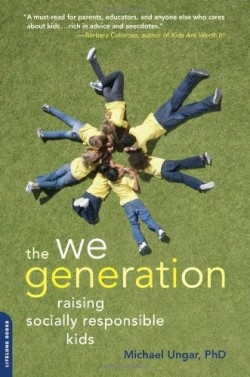The We Generation
Raising Socially Responsible Kids
Providing guidance to parents on how to raise children is an age-old tradition. Manuals are available on how to make sure that children are optimistic, happy, smart, spiritual, compassionate, gifted, strong-willed, self-confident, and healthy. Perhaps the most widely used guide was Baby and Child Care by Benjamin Spock, published in 1946, one of the biggest best-sellers of all time.
Michael Ungar adds a new handbook to show how parents can instill in their children a sense of compassion, giving priority to “we” rather than to “me.” He draws on other authorities, his own experience as a parent, and the understanding he achieved from years of providing social work counseling to disturbed families. Practical guidance is offered on producing children who are responsible for themselves and others. Ungar fully recognizes the difficulty of helping young people move from self-centeredness to caring for other people. Accordingly, he ends each chapter with a “Tips List” that offers effective suggestions on how to prepare children to become compassionate by engaging in simple acts of kindness.
The importance of associations with parents and other adults is explored in two chapters that show how relationships can lead to responsibility and to citizenship. What Ungar calls “good touch,” both physically and emotionally, is thoughtfully examined as a way of fostering connections and kinship. He carefully differentiates between exploitative sexual touching and the need for intimacy that can be satisfied without necessarily involving premature sexual activity although he acknowledges the inevitability of sexual exploration by young people.
Chapters are devoted to showing how children can be helped to take responsibility for themselves and others; to criticizing what are called “monster homes” in wealthy suburbs; and to arguing for communities that facilitate human interaction.
The weakest part of the presentation is Ungar’s brief discussion of spirituality. He asserts that organized religion “can run counter to the needs of a We Generation” and he urges parents “to encourage their children to be critical consumers of religion.” He states that religious identity can give rise to “hatred and prejudice” without fully acknowledging the richness that spirituality can bring into people’s lives.
The author of this helpful guidebook is a Canadian social worker on the faculty of Dalhousie University in Halifax, Nova Scotia. He earned bachelor’s and master’s degrees in social work at McGill University and his doctorate in social work at Wilfrid Laurier University. An accomplished researcher and practitioner, Ungar has numerous publications to his credit. His new book will deservedly enhance his well-merited reputation. It is a useful addition to the list of parental handbooks. (November) Morton I. Teicher
Disclosure: This article is not an endorsement, but a review. The publisher of this book provided free copies of the book to have their book reviewed by a professional reviewer. No fee was paid by the publisher for this review. Foreword Reviews only recommends books that we love. Foreword Magazine, Inc. is disclosing this in accordance with the Federal Trade Commission’s 16 CFR, Part 255.

